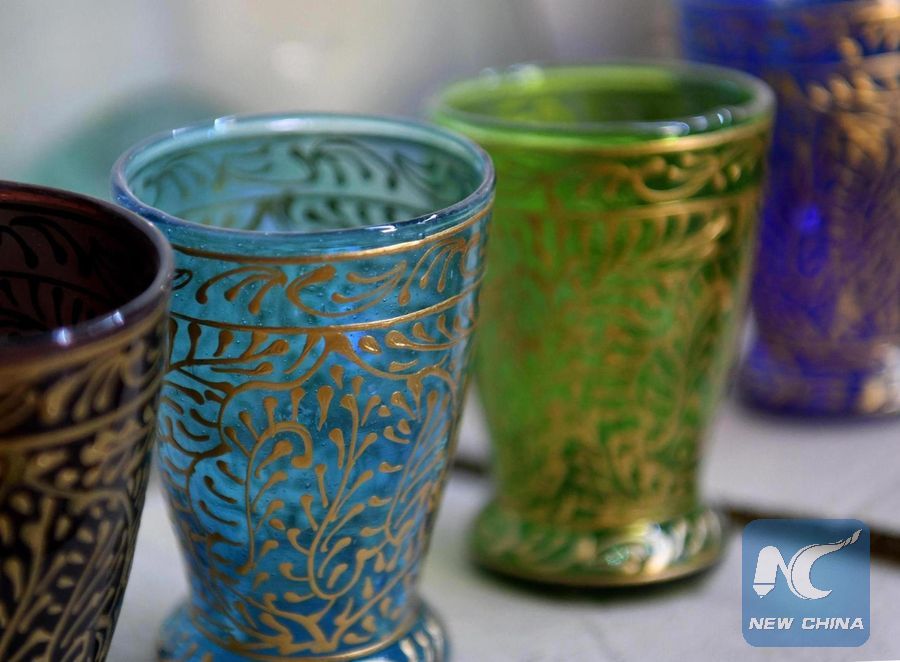
Handmade glasswares are put on display in the Zablatani area of Damascus, Syria on May 27, 2019. (Xinhua/Ammar Safarjalani)
DAMASCUS, June 7 (Xinhua) -- The handmade glassmaking in Syria is currently fighting to survive, but only with the passion of a handful of makers who are witnessing the slow end of this ancient profession.
As part of the natural evolution in life, some jobs have disappeared with passage of time, particularly those who could be substituted by machines, and the handmade glassmaking is no exception in the 21st century.
In the past, the handmade glassmaking was among the most important industries, especially as people needed different tools for the kitchens from water glasses to bottles to store oil and various types of food.
When the modern factories took over, this job did not die but was gradually confined to the making of art pieces for the tourists.
However, when the war in Syria erupted eight years ago, this profession was one of the first victims as most of the glassmakers either left the country or got internally displaced.
In a small workshop in the Zablatani area east of Damascus, Muhammad Hallaq, 62, and his two brothers and two workers, are the last generation still doing this job even though they believe that it would die soon.
Sitting in front of an oven, Hallaq kept rotating a hollowed metal tube with hands, while blowing his breath into the tube to mold a mass of melted glass into different glass shapes.
He uses other metal tongs to add carvings or a handle to the piece he is doing.
The workshop uses broken glass to make the new ones, so technically they recycle the broken glass collected from the streets or people who sell them.

Handmade glasswares are put on display in the Zablatani area of Damascus, Syria on May 27, 2019. (Xinhua/Ammar Safarjalani)
The workers put the broken glass inside an oven and wait for it to melt before using the tube to shape and create the new glassware.
Hallaq, who goes by the honorific name of Abu Naim, told Xinhua that he has been doing this job for 51 years.
At first, they were working in the Shaghour area east of Damascus and then moved to the so-called Glass Khan in the Zablatani area.
"We are the last people making handmade glass and if this factory is gone, this whole profession would be gone. You can say that this job has become extinct, and that makes me sad because it's my job and the job of my ancestors," he said.
Aside from the machine-made glass and how it took over, the man said that making handmade glass is a hard job to do because it requires patience and endurance of hard labor from the workers who usually work for long hours in front of the high heat of the oven.
Priding himself on inheriting the crafting job from his grandfather, Hallaq laments the fact that his children refused to learn it because it's hard and not profitable.
He said this job is no longer making good money but it's a passion-driven job, especially due to the decrease in tourism in the war-torn Syria.

Muhammad Hallaq, a 62-year-old glassmaker, shows handmade glass in his workshop in the Zablatani area of Damascus, Syria on May 27, 2019. (Xinhua/Ammar Safarjalani)
"This profession is of a tourism nature, so when the war started, we were the first to stop working and now we are the last to return," Hallaq said.
Hallaq dislike the machine-made glassware, citing that the handmade glass "has a soul, art, and creativity."
The man said that in order for this job to survive, it needs financial support to help the people to learn and help those who are currently working as many of them are displaced from their original areas.
A worker at his shop, Bashar Khalil, said he has been doing this job for 17 years and is still learning new technics from Hallaq.
The 38-year-old man said that he knows nothing but the handmade glassmaking, adding that if this job is to extinct, he could do nothing else.

Bashar Khalil, a 38-year-old glassmaker, creates handmade glassware in his workshop in the Zablatani area of Damascus, Syria on May 27, 2019. (Xinhua/Ammar Safarjalani)
"I started learning this 17 years ago and loved it and become fond of it, but if this profession is gone, I would have nothing else to do," he told Xinhua.
Khalil stressed, however, that he would "try to continue doing what I am doing even if I am alone."

